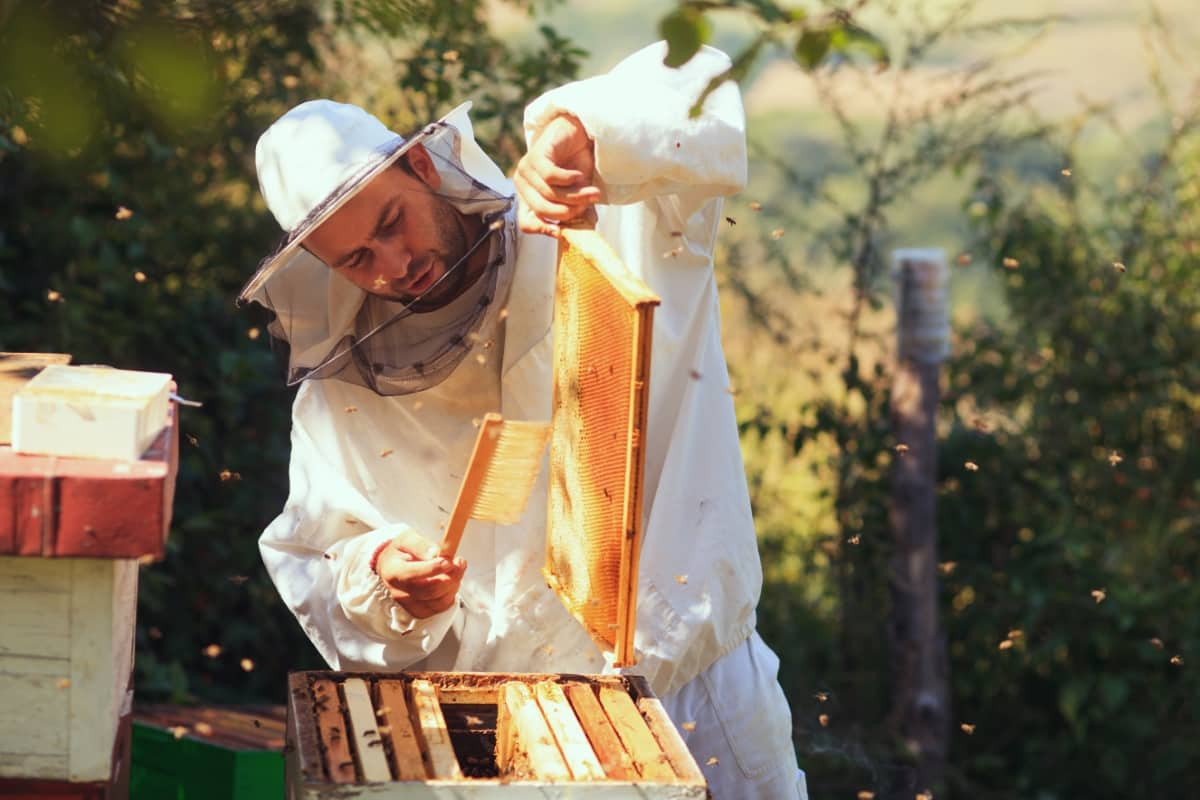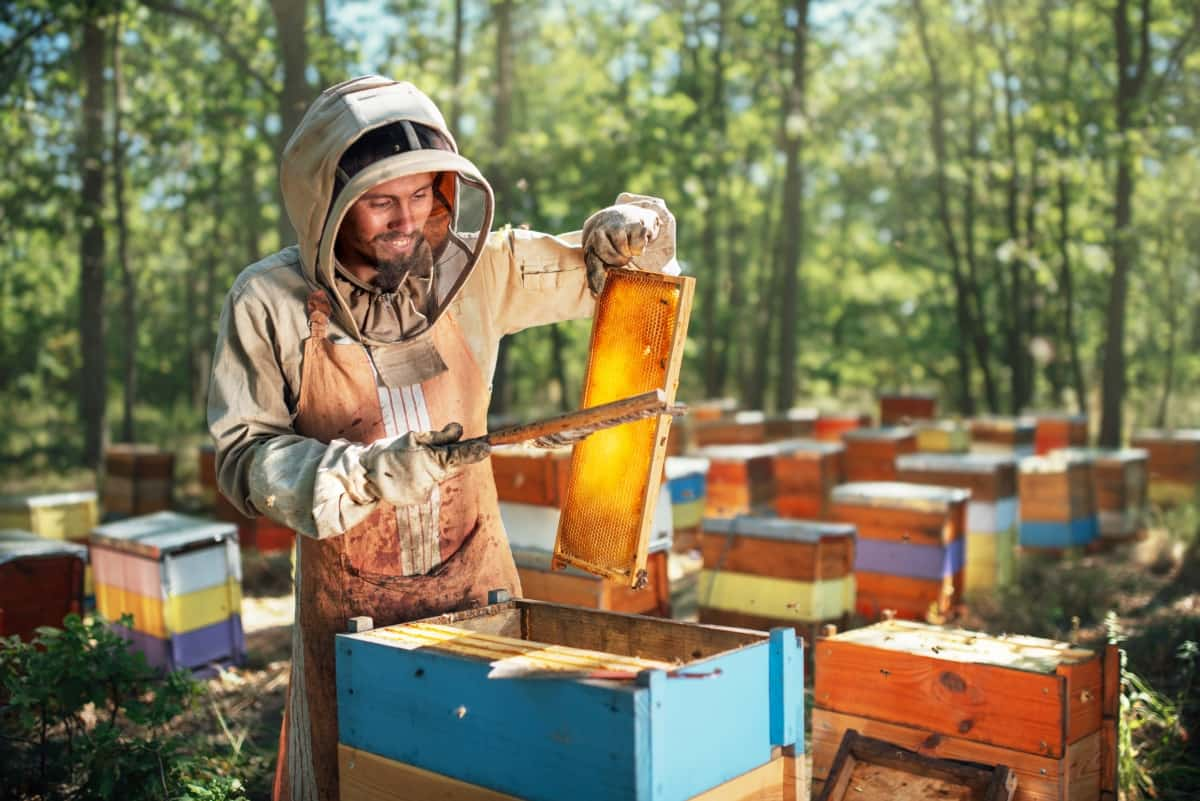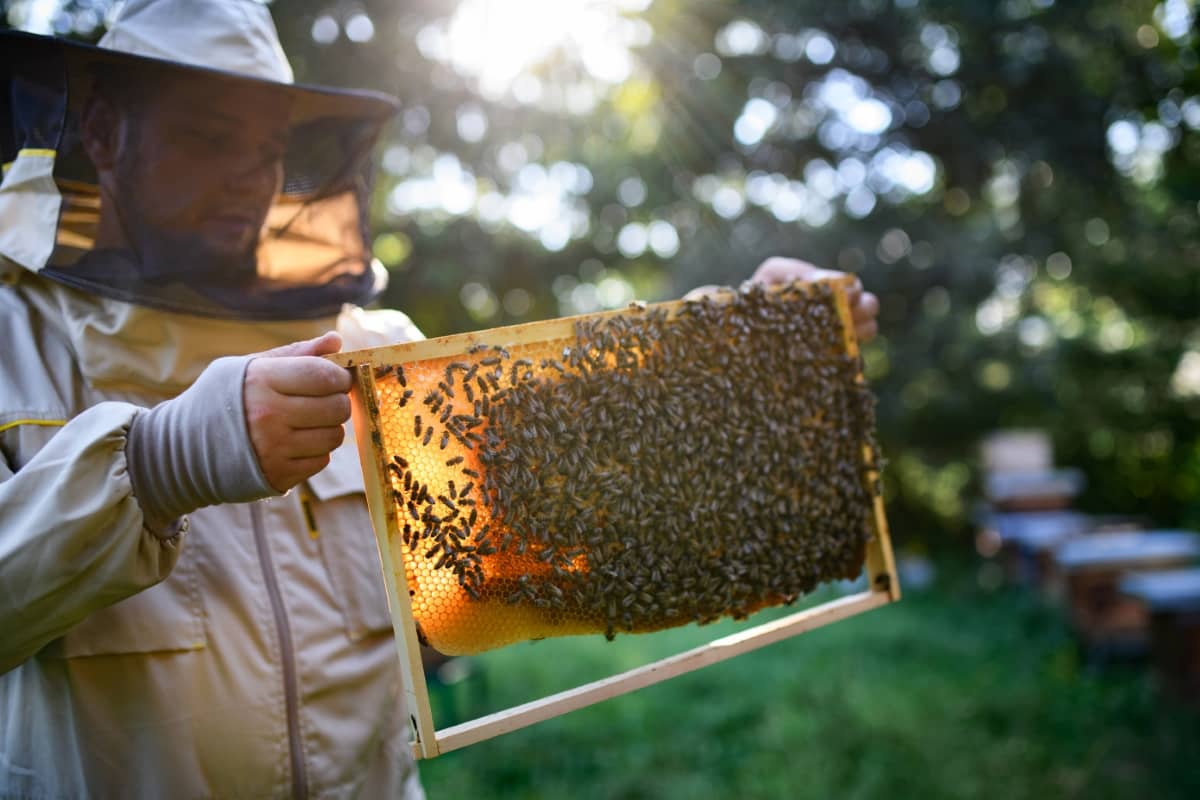Welcome to our comprehensive guide on launching your organic beekeeping journey for sustainable apiculture! This blog explores the fascinating world of organic beekeeping and its vital role in promoting sustainability. Beekeeping significantly impacts our environment, and adopting organic practices ensures our honeybees’ well-being and the whole ecosystem.

Get ready to discover the principles, techniques, and tools needed to embark on your sustainable beekeeping adventure. We’ll cover everything from setting up your apiary to managing hives organically, harvesting honey sustainably, marketing your organic honey, and overcoming common challenges.
Organic Beekeeping
What is Sustainable Beekeeping/Apiculture?
Sustainable beekeeping, also known as sustainable apiculture, refers to the practice of beekeeping that prioritizes the well-being of honeybees and the environment while ensuring the long-term viability of the beekeeping industry. It involves adopting methods that minimize negative impacts on bee health, biodiversity, and ecosystem balance.
Sustainable beekeepers focus on promoting the natural behaviors of honeybees, utilizing organic pest management techniques, preserving natural habitats, and reducing the use of synthetic chemicals. By practicing sustainable beekeeping, beekeepers contribute to the preservation of pollinators, protect biodiversity, support healthy ecosystems, and produce high-quality honey.
Understanding Organic Beekeeping
Regarding organic beekeeping, the focus is on avoiding artificial products and chemicals in nourishing and managing bee colonies. Like organic farming, organic beekeeping is subject to legal regulations and certification requirements to ensure adherence to organic farming standards. This applies both at the local and international level. Organic beekeepers prioritize natural feed for bees, such as pollen and nectar, as they contain essential nutrients that cannot be fully replicated with artificial substitutes.
Feeding practices in organic beekeeping aim to let the bees feed themselves, considering their preferences for certain flower nectar and pollen. Organic beekeeping also involves avoiding harmful fertilizers, pesticides, and chemicals near beehives, which can contaminate the nectar, bees, and honey. Organic treatments and disease management methods are employed to address common bee diseases, and meticulous records of feeding, treatments, and other processes are maintained to comply with organic certification requirements.
The type of bee variety kept is also crucial, as certain varieties are known for their disease resistance, aligning with the organic principles of the apiary. Natural materials, such as residue-free honeycombs and organic wax, are used in beehive construction, and even the contents of the smoker used in beekeeping should be organic.
Setting Up Your Organic Beekeeping Operation
- Choose a location with ample nectar and pollen sources, away from pesticides, and with clean water.
- Select hive types and equipment from organic materials for bee health and easy management.
- Source organic honeybee colonies and queens from reputable breeders prioritizing bee well-being.
- Practice proper hive management, including regular inspections, disease monitoring, and organic pest control.
- Create a bee-friendly environment by planting organic flowering plants and providing water.
In case you missed it: Apiculture/Beekeeping Success Story: Check How This Beekeeper Turned Into Millionaire

Organic Sustainable Beekeeping Practices
Understanding and implementing sustainable beekeeping practices are for honeybees’ well-being and their population’s preservation. Bees play a vital role in pollinating flowers and crops, with a single colony capable of pollinating millions of flowers daily. In fact, over one-third of the world’s food supply relies on bee pollination. As humans have domesticated bees for honey and wax production, our impact on their welfare has increased. There are three main ways in which humans affect honeybee welfare:
- Habitat and environment management: Humans influence bees by managing their nesting habitats, food sources, and the overall environment provided to them.
- Genetic diversity and distribution: Human activities like removing bees from their natural habitat, breeding practices, selection, and queen importation impact the natural distribution and genetic diversity of honeybees.
- Colony management and hive technology: Beekeepers’ practices in managing and manipulating colonies and the technologies used in hive construction can impact honeybee welfare.
- Many bee species are now vulnerable, endangered, or critically endangered, underscoring the importance of sustainable beekeeping.
- Sustainable practices aim to maintain healthy bee populations by:
- Keeping additional bee colonies
- Creating flower-rich landscapes
- Offering clean water sources
- Ensuring ample nectar and pollen availability
- Considering bees’ natural life cycle when managing hives.
11 Principles of Sustainable Organic Beekeeping
- Prioritize bees as pollinators first and honey producers second.
- Avoid feeding bees with monoculture flowers that require synthetic pesticides and herbicides.
- Learn about honey bee races and choose local or suitable races for your area.
- Create a bee-friendly garden or environment with nectar and pollen-rich plants, avoiding synthetic pesticides.
- Minimize sugar feeding and use their honey as the primary food source, except in emergency circumstances.
- Harvest honey only when there is excess and sufficient nectar flow.
- Limit hive inspections to necessary occasions to maintain nest scent and warmth.
- Label your honey clearly with production details to differentiate it from commercial honey.
- Select hive types that mimic natural sites like hollow trees or wooden hives.
- Minimize smoking bees to avoid stress and honey congestion, allowing them time to adjust.
- Promote hygiene by keeping hives at a distance, allowing natural reproduction through swarming, and using natural disease prevention methods.
Challenges and Troubleshooting Organic Beekeeping
- Varroa mites: These parasites pose a significant threat to bee colonies and require effective organic control.
- Colony diseases: Organic beekeepers must use natural remedies to monitor and address common diseases like American foulbrood and chalkbrood.
- Weather conditions: Extreme weather events like droughts or floods can impact foraging and weaken bee colonies. Providing supplemental food and water sources can help mitigate these challenges.
- Pesticide exposure: Organic beekeepers must avoid pesticide-contaminated areas to protect their bees from harmful chemicals.
- Swarming: While swarming is a natural process, it can lead to the loss of colonies. Beekeepers should be prepared to manage swarms and prevent their departure.
- Hive management: Maintaining optimal hive conditions, including ventilation, health, and sufficient space, is crucial for colony success.
- Honey production: Organic beekeepers may need help producing sufficient honey yields due to weather, forage availability, and colony strength.
- Beekeeper education: Staying informed about organic beekeeping practices and attending training programs can help address challenges and improve beekeeping skills.
In case you missed it: Importance and Role of Honey Bees in Oilseed Crop Pollination

Conclusion
Embarking on an organic beekeeping journey is a rewarding and sustainable endeavor. By following the principles of sustainable beekeeping, promoting bee health, and staying informed, you can contribute to the well-being of bees and the production of high-quality organic honey.
- Feed Your Flock for Less: Top 10 Tips to Save on Chicken Feed
- Ultimate Guide to Ossabaw Island Hog: Breeding, Raising, Diet, and Care
- Hatching Answers: The Top 10 Reasons Your Chickens Aren’t Laying Eggs
- Eggs and Economics: Breaking Down the Cost of Raising Backyard Chickens
- Defend Your Greens: Proven Methods to Keep Iguanas Out of Your Garden
- Ultimate Guide to Cinnamon Queen Chicken: A Comprehensive Guide for Beginners
- Ultimate Guide to California Tan Chicken: Breeding, Raising, Diet, Egg-Production and Care
- Ultimate Guide to Marsh Daisy Chicken: Breeding, Raising, Diet, and Care
- 10 Types of Chicken Farming Businesses You Can Start for Profits